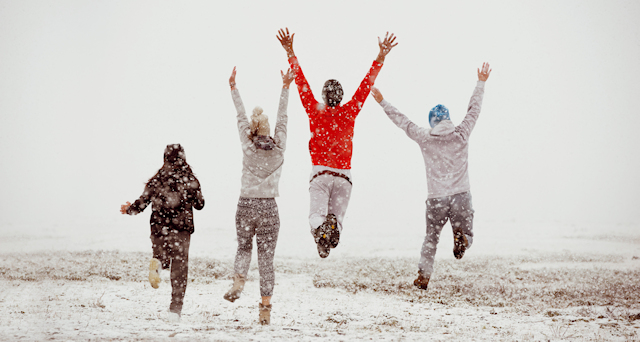Preparing ourselves for winter is usually little more than changing our wardrobe from summer to winter clothes. But being winter fit is more than keeping warm. The changes in temperature and light can impact on both our mental and physical health.
Some of us are looking forward to this time of year because our chosen sport’s season is played during the winter months. But many others look at winter as more of a time of hibernation. Most of us can appreciate a crisp frosty morning with blue a sky, and the odd day of snow can bring a bit of excitement. But day after day of grey damp weather can drive us crackers and dreaming of sunnier climes.
A season of two halves
For me, I think of winter in two halves, the run up to Christmas and the run down to spring. From the time of the schools returning from their summer break to the Christmas holiday can seem like a bit of a blur. The time flies by with Halloween, Fireworks’ Night and the Christmas season of shopping, parties, and family visits. We blink and New Year’s Eve is here before we know it!
January and February are the darkest and coldest months before the daffodils blume in March. January 15th, 2024 is slated to be the next Blue Monday, or in other words the saddest day of the year. So, we can’t wait to welcome the warmer and brighter days that arrive in May.
What happens to us over the Winter?
Every year winter has a huge impact on the health and well-being of people across the UK. Our bodies are fighting a constant battle to keep temperature at 37.5oC to protect our cells and organs. Everyone is different, some like their homes warm and snug, while others are happy to put on an extra layer of clothing. Either way the outdoor temperature is mostly a lot cooler than indoors. So, our bodies must keep adjusting to the temperatures around us.
Blood Becomes Thicker
When we become cold our blood will start to thicken, which in turn increases the risk of clotting. Therefore, after periods of cold weather, the numbers of strokes and heart attacks increase. We should never underestimate our own risk of heart disease. For more information, see the British Heart Foundation website to see ways of lowering your risk of heart disease.
Seasonal Affective Disorder (SAD)
After the Autumnal Equinox in September, night will be longer than day until the Vernal Equinox in March, where day will become longer than night. It’s during this period when the nights are longer that many suffer from SAD or “winter blues”. Symptoms vary in severity, but common symptoms include:
- feeling low or sad
- loss of pleasure, motivation, and interest
- feeling fatigued
- craving carbs and putting on weight
While it’s not fully understood what causes SAD, it is linked to the winter months and changes to the body’s hormones during that period. For more information see the NHS Guide for SAD and how to reduce its impact.
Increased Flu, Coughs and Colds
Most healthy people can shrug off the barrage of winter colds and flu. But for the immunosuppressed and the elderly, they can pose a greater risk to complications like pneumonia. So even if you only get mild colds, you should think of those around us to minimise the risk of passing on something that could be catastrophic to someone else.
Vitamin D
Vitamin D is a micronutrient that helps regulate the amount of calcium and phosphate in the body. It is essential for keeping bones, teeth, and muscles healthy. Due to the reduced amount of sunlight combined with staying indoors, we do not produce the amount of vitamin D needed. Government advice is that we should consider supplementing with vitamin D during autumn and winter.
However, vitamin D can also be found in some foods:
- red meat
- oily fish
- liver
- egg yolks
- fortified foods (foods with added nutrients), e.g., breakfast cereals, plant milks and some spreads.
From March through to September most of us can create enough vitamin D from sunlight.
Winter Weight Gain
Gaining weight in winter is common for several reasons. The obvious reason is the increased consumption of food and alcohol over the Christmas period. But there are a couple of more subtle reasons why we gain weight during winter. People generally consume more calories to keep warm while being less active. After Christmas we still have all those left over sweets and goodies to finish off. All this equals a gradual weight gain over the winter.
While putting on a couple of pounds over winter may not seem much, but after a few winters it can add up to a significant amount. So, those extra pounds need to be knocked on the head as early as possible.
Injuries
It may seem obvious that there are more injuries during the winter months. But it’s not just the elderly slipping and falling, or skiers colliding with objects in their path. In general, there are more accidents during the winter because of the cold, lack of light or the combination of both.
Aches and Pains
Many find general aches and pains are worse during the winter months and this can be down to several reasons:
- neck and shoulder pain from draughts, especially in the bedroom.
- knee pain from arthritis can be made words from sedentary jobs or driving long journeys.
- sciatica can happen at any time, but cold muscles are easier to strain.

Family Enjoying Winter
What can we do?
Dress for the occasion
It’s very tempting to avoiding wearing bulky clothes, especially when going from a warm home to a warm office. Our cars are nice and warm, so it makes sense not to bulk up with too many clothes. Great if you never break down or stop for some reason.
It’s just good to be outside, and the winter air always seems fresher. So, dressing up with the appropriate layers is a great way to stay warm and enjoy the winter air.
Keep Moving
Activity is probably at the top of most lists for healthy living. Not only does an active life benefit both our physical and mental health, it also helps reduce the risk of putting on those extra pounds and lifts our spirits with producing the feel-good hormones called endorphins.
Warmups
Warmups prior to exercise are essential to lowering the risk of injury. Putting demand on cold muscles will increase aches, pains, and increases the risk of pulled and strained muscles. Warmup time should increase with age and should never be underestimated. After exercise, keeping warm is essential to allow a controlled cool down to protect muscles. Ideally you should avoid consumming anything with caffeine after exercise but a protein-based drink is an excellent choice.
Eat Sensibly
So far, so good. But Christmas is coming, and food and booze is an important part of the festivities. Absolutely true! While Christmas can be stressful for many, for others, it’s a time to destress and enjoy the season. So, abstinence is not on the menu. But we will be better for not overindulging. It’s often said that it takes 20 minutes for the brain to register when the stomach is full. But while that it’s true when we eat until we feel full, we have eaten too much. But that’s not the Christmas issue, because our eating habits change for the season. We tend to graze sweet and fatty foods, washed down with sweet or alcoholic drinks. Therefore, we may not even feel full, but the calories can still skyrocket.
Take time to De-stress
Yes, it’s true with all the chaos leading up to Christmas, it can be difficult to get some “me time” in. But the benefits of lower stress can make all the other times more tolerable. During the winter months we could all do with lower stress, less aches and pains, more sleep and just being more relaxed. I know it’s tempting to leave it until the new year, but lowering stress is always a win.
Have Regular Massages
Make Pure Body Fix® massage part of your wellbeing strategy. Everyone knows how stressful the run up to Christmas is. But to take the time out to have a massage can make all the difference between a stressful and enjoyable season.
When the New Year comes and we want to make achievable resolutions, regular massages should be near the top of the list. Lower stress and reduced aches and pains can make all the difference. If you’re a sports person or want to get more active for the New Year, then having an assessment to prevent injury can give you a head start to improve fitness.
To give a loved one a Pure Body Fix® gift voucher could be one of the best Christmas presents you can give this year.
Although winter throws up many challenges, we can be kind to ourselves by recognising the risks to health or from overindulgence. Then you can welcome spring ready for the return of warmth and light.






